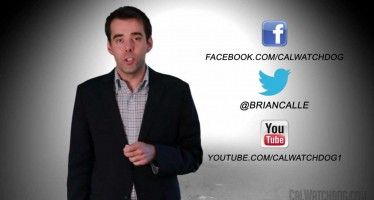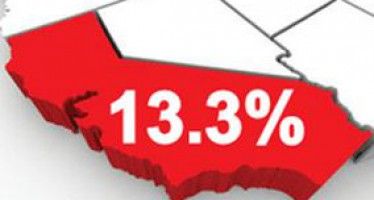Tough Talk Can't Hide Tax/Spend Budget
JAN. 11, 2011
By JOHN SEILER
In his Jan. 3 Inaugural Address, Gov. Jerry Brown promised us a respite from the “smoke and mirrors” budgets of recent years, especially those of ex-Gov. Arnold Schwarzenegger. So the budget he unveiled Monday, for fiscal year 2011-12 beginning on July 1, uses mirrors and smoke.
The main parts of the budget are $12.5 billion in what he called “drastic cuts” and $12 billion in new taxes to end the projected budget deficit of about $26 billion. The new taxes essentially would extend the “temporary” tax increases Gov. Arnold Schwarzenegger signed into law two years ago; and which have not solved the state’s deficit problem.
Moreover, a recent study by three economists found that, over the past 37 years, nations around the globe reduced debt burdens only when spending cuts were on average 85 percent of a budget solution, with tax increases only 15 percent. Andrew Biggs, Kevin Hassett and Matt Jensen wrote:
On average, the typical unsuccessful consolidation consisted of 53% tax increases and 47% spending cuts.
By contrast, the typical successful fiscal consolidation consisted, on average, of 85% spending cuts. While tax increases play little role in successful efforts to balance budgets, there are some cases where governments reduced spending by more than was needed to lower the budget deficit, and then went on to cut taxes. Finland’s consolidation in the late 1990s consisted of 108% spending cuts, accompanied by modest tax cuts.
So, if the study is right and tax increases should be limited to about 15 percent of a deficit-reduction plan, then California’s tax increases should amount to no more than about $4 billion, with spending cuts at $22 billion.
Put another way, the 85 percent/15 percent ratio signals to investors and creditors that a government really is serious about getting its fiscal house in order, not just soaking taxpayers again for more profligate spending.
As to Brown’s actual budget, Esmael Adibi told me, “I am a little disappointed with this budget. There is nothing fundamental that was proposed.” Adibi is director of the A. Gary Anderson Center for Economic Research and Anderson Chair of Economic Analysis. He added of a major Brown proposal in the budget:
One could argue that shifting money to local and state government is a fundamental change, but I don’t see it that way. The only outcome is more confusion when it comes to year-over-year comparisons. To make any meaningful comparison now, one has to add up the general fund, special fund and bond fund together and compare the total to previous years. I have tried to do that but I can’t find the special fund spending for 2010-11 budget. I have an estimate which I’m not sure about, which is $30.85 billion. If I use that, I don’t see where the $12.5 billion cut is coming from. At best, the cutback is $3.5 billion; and that, as you know, is not necessarily a real cut, but rather, it is a cut from planned spending in 2011-12.
By the way, there are some proposed changes in business taxes leading to higher effective corporate taxes.
As for the economic impact of the budget, the temporary tax increases were a drag on the economy. And if the Brown tax increases enacted, they will continue to be a drag. If it does not pass by the voters, then we should expect to see real cuts including reduction in payroll in a meaningful way. That remains to be seen.
Will the voters go for tax increases?
In both the May 2009 election and the December 2010 election, California voters turned down major tax increases. The May 2009 tax-increase proposal was a similar extension of the February 2009 Schwarzenegger tax increase, but for only two years compared to the five years Brown now wants.
It is odd that Brown asked for so many years, instead of one or two years, which one might assume would be easier to get voters to accept. Perhaps he wants the proposed tax increase to fail in June, which would force the issue of the need for more spending cuts. Armed with the evidence of the voters’ wrath, Brown then could go to the Legislature and the powerful public-employee unions and say, “I tried my best. The voters said no. More spending cuts, please.”
Republicans so far are not cooperating. In 2009, six Republican legislators were required to break ranks to get the two-thirds supermajority needed for the Legislature to put a ballot measure before voters. Schwarzenegger got them by various promises of future gain. Then state-Sen. Abel Maldonado became lieutenant governor. And the Bee reported of ex-assemblymen Anthony Adams and Mike Villines being given lucrative appointments during Arnold’s last days in office:
Adams, R-Hesperia, will be paid $111,845 annually to serve on the Board of Parole Hearings, while Villines, a Clovis Republican who lost a 2010 bid for state insurance commissioner, was named to a part-time position on the Central Valley Flood Protection Board at a salary of $40,669.
For now, at least, Republicans in the Legislature remain solid against tax increases. Unlike the ostensibly Republican Schwarzenegger, Brown is a Democrat with little cachet among Republicans.
Even Maldonado, apparently chastised, has had a change of heart, or at least rhetoric:
I’m going to work against this tax increase. We told the people of California that it was temporary, and it was going to be temporary. And that if they allowed us a temporary tax, we were going to make some decisions. And taxes should be the last and final emergency resort.
Republican Senate Leader Bob Dutton of Rancho Cucamonga said:
I am not open to the idea because nobody has demonstrated anything to me that shows we are going to do anything different than we have done before. Voters were given this choice back in 2009 and they rejected it and frankly they were right to reject it. We didn’t fix anything, so why would the voters believe you now that you’re going to fix the problem even if they would give you five more years of the same thing?
And although the national Tea Party Republican revolt fizzled when it got to California, with Republicans wiped out last November, the revolt still resonated here among many Republicans. It may be difficult to find even one Republican legislator who would back Brown’s tax increase.
Which means the tax increase might not even be put before voters.
What next?
If California doesn’t get its fiscal house in order, and pronto, it may face a similar crisis to that of Illinois, which can’t pay its bills. Proposed spending cuts and tax increases aren’t enough, bond holders have told the state. Reported the Chicago Tribune Monday:
Illinois is paying about 2 percentage points more on 10-year bonds than states with top-rated credit, said bond expert Brian Battle, director at Performance Trust Capital Partners, a Chicago-based investment firm.
“What is killing us are the long-term pension and health care payments, and nothing substantive has been done about that,” Battle said.
Unless the plan is reworked to cut the state’s spending and its liabilities for pension and health care costs, bond investors will continue to insist that the state pay a risk premium, he said.
Some analysts have said that Illinois needs a proposed hefty hike in income taxes. While others say that the problem is spending.
Which brings us back to the study by the three economists mentioned at the top of this article. It found:
Consistent with other studies, we found that successful consolidations focused on reducing social transfers, which in the American context means entitlements, and also on cuts to the size and pay of the government work force. A 1996 International Monetary Fund study concluded that “fiscal consolidation that concentrates on the expenditure side, and especially on transfers and government wages, is more likely to succeed in reducing the public debt ratio than tax-based consolidation.” For example, in the U.K’s 1997 consolidation, cuts to transfers made up 32% of expenditure cuts, and cuts to government wages made up 21%.
Eventually, the cuts will have to come for a simple reason: spending was too high in the mid-2000s under Gov. Schwarzenegger. Flip to Appendix Page 12 at the back of Gov. Brown’s budget proposal and you’ll find Schedule 6. It shows these spending increases in the general fund:
Fiscal 2004-05, $79.8 billion, to fiscal 2005-06, $91.6 billion. That’s an $11.8 billion increase in spending in just one year, a whopping 15 percent increase.
Fiscal 2005-06, $91.6 billion, to fiscal 2006-07, $101.4 billion. That’s a $9.8 billion increase in just one year, an 11 percent increase.
It was a one-two punch to the California budget’s solar plexus. Even the Great Recession had not begun the next fiscal year, such spending increases would not have been sustainable. Schwarzenegger simply spent all the bountiful taxes generated by the real-estate boom and never prepared us for the inevitable bust that some people — such as yours truly — warned about.
Arnold’s gone. But the state still is finding it hard to get out from under his overspending. The only thing for certain in the future is more fiscal pain.
John Seiler is a reporter and analyst for CalWatchDog.com. His email: [email protected].
Related Articles
New 2015 laws: Hollywood wins, in-home care loses
New Year’s Day sure wasn’t a holiday from new regulations: 2015 brings 931 new laws Californians must obey. Some took effect on Jan. 1;
Video: Los Angeles faces bankruptcy
July 10, 2012 By Brian Calle
Tax Foundation: CA has fourth-highest state taxes
The newest figures just released by the Tax Foundation show California continues to be one of the highest-taxes states in




